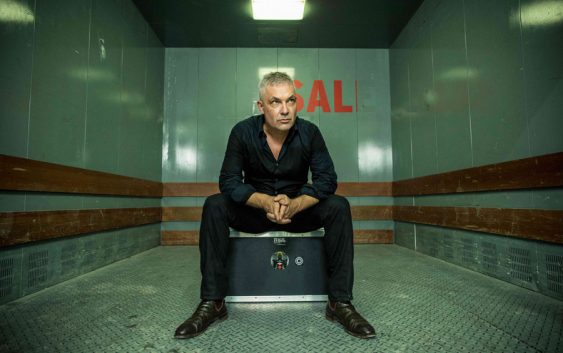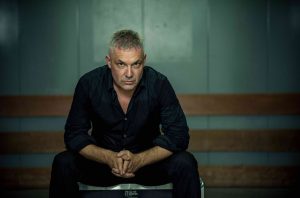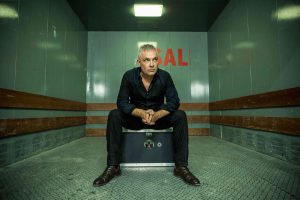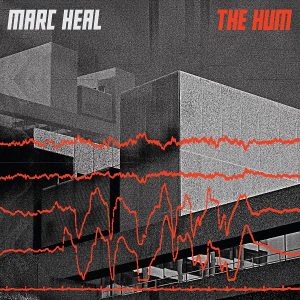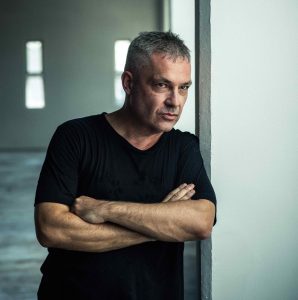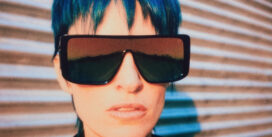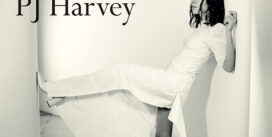Marc Heal has been primarily known for his project Cubanate that was a vital part of the industrial music scene during the 90s and considered as influence on several new bands in the genre. However, that is by far not all that Marc has done during his music career. He collaborated with Jean-Luc De Meyer of Front 242 on C-tec, Raymond Watts of PIG and other notable names on the scene. His work hardly stops there, but you can always Google him up and check the facts.
The release of his first solo album, The Hum, in 2016 provided us with the opportunity to chat with Marc.
1. Hello Marc, thanks for the interview. Before we pass on to your latest work, The Hum album, I believe it would be only fair to introduce Cubanate to our readers. You combined techno beats with metal, which resulted in the peculiar and recognizable Cubanate sound. What inspired you to do such work?
In the early 90’s I was going to raves. I loved that whole underground electronic explosion in the late 80’s early 90’s. Well, the techno side of it. House music, not so much. Anyway, when I was dancing I always heard a guitar in my head, riffs, vocal chants. Also for some reason E made me feel mischievous rather than blissed out.
So Cubanate put vocals and guitars over were essentially primitive techno beats. We were amongst the very first to fuse things in that way so we got lots of attention in the UK music press, got our videos on MTV. We were on Wax Trax towards the end of the label. Our breakthrough came in 1994 with a song called Oxyacetylene. It still gets played out. Then a few years later a few Cubanate songs went onto the Gran Turismo game. We reached more people with that game than if we’d toured for 50 years. Made good coin too.
2. You were rebellious and full of youthful energy. How did you feel about your music and lyrical expression back in the 90s? What was the idea and the driving force behind the project?
I was rebellious but not that young actually. I was 27 when we signed that first record deal. I’d been signed a couple of times before in the 80s.
In terms of expression, Cubanate was never essentially about the lyrics. Not the first three albums. It was really about seeking a moment.
You know the kind of thing. It’s 4am on a dancefloor. You’re wired. The strobes cut through the dry ice. A sloe-eyed Ukrainian gothette is gyrating next to you. She’s, I dunno… a painter, in oils. An artist. Of noble blood. As inspiration for a novel she is proposing you both change your identities to spend three months having sex on experimental drugs in a Bavarian mountain hideout once used by the Nazis. You feel, supreme, doomed, horny, all-seeing, transcendent.
Why can’t it always be like that?
3. You described Cubanate’s music as “unpleasant, obnoxious, loud”. Would you agree that the music Cubanate created was not for just any listener?
It doesn’t seem so obnoxious now. That’s because a lot of the sounds we were using have become mainstream.
4. Cubanate was recognized in UK and abroad. How did the project end? What made you change your mind about going back together and playing live again?
I think that, looking back, despite my bravado, we weren’t ready for what happened. For the first couple of years Cubanate were a club act really, blanketed in a little London scene. I wasn’t mentally prepared for the pressure of the antagonism we stirred up after Oxyacetylene and the Carcass tour and I wasn’t prepared for the touring. I mean, we had no protection – no management, not even a tour manager worth the name. I was working hard on Cubanate, C-tec with Jean-Luc Demeyer, other projects. I was sick with drink and I had no one supporting me or even that I trusted. Not that I blame anyone else. By 1999 things were falling apart. We all needed a long break from Cubanate, it was going nowhere.
Phil and I have worked together again occasionally over the past few years anyway, remixes, that kind of thing. It was more a question of motivation. I always thought that if we played again anywhere it would be Coldwaves first. We toured a lot with Jamie and Jason back in the day. It felt like a pilgrimage. Jason Novak is persuasive. And persistent.
5. You were playing at Cold Waves festival in Chicago and now I see that there are also UK dates for this year, Glasgow and London to be precise. I assume you liked playing live again after so long. How was Cold Waves experience for you?
Yeah, it had been a long, long time since playing live. Phil and I both travelled to Chicago from other sides of the world. We met up with our drummer Vince McAley, from Die Warzaw, who I’d never met before. The three of us spent three days intensively rehearsing and then we went onstage.
Cubanate music contains an inherent fury that’s impossible to contain. We only played a 40-minute set. Crazy, but a blast. We always said that if it was fun we would do more, if not, forget it. And it was. Now we’ve got the retrospective album of remastered tracks coming out. It’s called Brutalism 92-96. So we’re cautiously playing some more dates to support the album. Two UK dates in April, then maybe back to the US again, maybe Europe.
6. Let’s fast forward a lot of years and find you in Singapore. What made you move there? How did you adapt to the new culture? Would you say that the move had influence on your decision to write solo material?
I was offered a job in Singapore and I thought, why not? A new career in a new town, as the man once said. It’s good to shake things up, to shed a skin every now and then.
I find the East strange, thrilling, often cruel. But there’s a dynamism here. You fly into Singapore, there’s literally two or three hundred massive tankers parked up at night. The West is chock full of middlemen and fluffers and strokers. Everyone is an estate agent or a life trainer or a financial adviser. But here we actually make stuff. The East is the engine now.
For some reason I write better here, for the moment anyway. Everyone is different. Me, I seem to do best when I’m an outsider, on my own.
7. When I read one of your previous interviews, I seem to remember that you mentioned how Bowie’s death had strong influence on your solo work. Can you explain in what way, of course, if I’m not mistaken? Has Bowie been one of your music influences?
Sure, Bowie was a big musical influence. But what I more meant by that comment was that his death jolted me into action. Just as I was writing the Hum, Bowie’s death was announced and the story of how he had made Blackstar came out. At that exact time I was making excuses to myself – you know the kind of thing. “Make an album? You? No point. You’ve been gone too long. No one will be interested. It’s not Cubanate. You can’t do it by yourself.” Et cetera. But once I realized that Bowie had still been making music, even on his deathbed, it threw shade over all my whimpering. Well, I thought, DB was brave enough to make an album when he was dying of cancer. What were your problems again, Marc? Are you really such a coward?
8. Some reviews of The Hum draw parallels with Numan’s work. Apart from the fact that some of the equipment used was the same, I don’t think his work was influence behind your album. However, I must admit I am completely ignorant when it comes to the synths or recording technologies that you used. Can you bring the writing and recording process closer to us?
I recorded roughs of the songs at home. Then I found Lion studios in Singapore, this vast old space with an old Polygram desk, one of only three ever made. The desk was kaput, but I got a few things working.
I recorded alone in the control room, at nights. It was spooky. Then I hired a small room to program. Working at Lion did give a sense of occasion to the sessions. It felt special, like a playground, a dream. There were old effects and synths there that I decided to use, since it seemed like the fates had left them for me. Like the Polymoog. I think that’s where people get the Numan thing from, those big string lines.
Rather than spend hours on sound and getting everything tight, like dance music, I decided to go back to a more live feel, using the computer audio like a tape machine. So there’s a looseness, an immediacy.
9. As we, hopefully, grow wiser from various experiences that life gives us, we also start thinking about different things than in our youth. And I can see that you did that with The Hum‘s lyrical content. How was the writing process for you in that sense? What did you feel that you need to speak about some 20 years later?
I guess that when you are young you are more wrapped up in yourself. Big ideas awe you. You’re dumb and you’re confident. But that’s the thrill of youth. Sex and relationships are so new, and you see everything in such sharp relief that you want to explain it all to the world.
Later in life you’re more cautious. You carry battle scars. You’re able to take a more critical perspective. Luckily for me, Industrial music suits a more jaded, flint-eyed gaze on life.
I knew only that I wanted to write big and human. To write about adult themes. Divorce, corruption, compromise, money, suicide. You can’t do that when you’re young.
10. You wrote and recorded the album on your own. How was working in solitude like? Did you find the process claustrophobic or liberating?
I would say that it was necessary to define what I was trying to do by myself. I think an essential the mark of a writer is to prefer your own company. I have often thought that I would adapt well to prison. I mean the solitary confinement bit, not so much the gang sodomy and razorblades in my mashed potato portion.
Anyway I wasn’t completely alone. Later in the process I had Benny Ong on guitar in Singapore and Jules and Giles from Armalyte in the UK to advise on the mixes. Also I found social media useful. OK, so I was alone, but I could think aloud and make jokes as I went along. People sent messages of support. So it didn’t feel so isolated.
11. Artists usually doubt their work before presenting it. Considering this was your first solo album, how did you feel before the actual release?
Oh, I am always in doubt. I realize that my abilities are very limited. Once I had delivered Adult Fiction, about the third track, I guess, I grew in confidence. I was sure that the album was good, but I was uncertain what other people’s reactions to the new sound would be.
12. The Hum got really great reviews and response from media and audience. I have talked to some friends about it and we all find it an excellent piece of work. Fresh and completely new Marc Heal, that’s how I feel about it. But one thing hasn’t changed. Your voice. How are you pleased with the feedback? Did you expect such a good reception?
Thank you. I did try to be more creative with my vocals. I don’t think I’ve ever done anything like Wounded Dog before. But yeah, the voice is a rough old thing.
As I say, I wasn’t sure what reactions to expect to The Hum. If you are confident I suppose you shouldn’t care about reviews. But I was interested to hear what people thought of it and always delighted to hear someone likes it.
I wanted to try to shift people’s perceptions of what could be done within a hard electronic approach. I think I achieved that. It’s a scene full of such intelligence, yet trapped within its own tropes. I’ve lived with them for so very, very long. Terminator, Helllraiser, 1984, Brave New World, William Gibson. William Burroughs. Yada–dystopian-yada-yada. You know what? Enough Naked Lunch already. This time I very consciously rejected Burroughs, ditched cut-up techniques. And I flew.
Of course a lot of people just want the same old, same old. I’ve learned that in this scene everyone is always asking why you can’t make another album like the one before last.
13. You said that the album offered adult music for adult people, and I really felt it was so. It is mature, deep, intelligent and thoughtful. The music world needs more albums like this one. Have you considered writing new material that would follow in its footsteps?
Just mulling it over. I’m not quite sure how it will turn out. I can’t really “decide” to write in a particular style, I’m not that disciplined. I’d really like to try something more upbeat but the few tracks I’ve written since The Hum have been ultra slow and gloomy. But nothing has congealed yet.
The secret, I’ve found is to dig deep. Don’t paint pictures of the easy stuff. Look for situations and emotions that make you feel uncomfortable. Chances are, that’s where the inspiration lies.
14. The plans for new live shows with Cubanate aside, is there any chance you play live as Marc Heal?
Everyone wants Cubanate right now but I would love to take The Hum out. I’d play support. I’d do weddings, bar mitzvahs.
15. I know you wrote the book The Sussex Devils that was published in 2015. I didn’t have time to read a lot about it, but this may be the right opportunity. Can you give us an idea about what the book is about and what made you write it?
I discovered an old newspaper clipping from 1986. It concerned the court case of a man named Derry Knight. He had claimed that he was a senior member of a secret occult group operating among the British establishment. Helped by a priest in Sussex, he had raised large sums from wealthy people on the pretext of destroying powerful Satanic regalia. The whole story made me very uneasy. I recalled almost nothing about it – even though I had known the priest well as a teenager in the 80s. I had witnessed the panic over Satanism and the hysteria in Sussex religious meetings at the time: speaking in tongues, prophesy, all that stuff.
It’s an examination of mass hysteria and it’s partly autobiographical. And it’s a detective story. Why did I know so much yet I recalled so little? I tried to find out the truth.
16. How hard is it to simultaneously write a book, compose music and be involved in TV production? How do you divide your time to work on different projects?
Keeps me busy. I know that I can’t just “do” music, it would drive me insane. The creative business interests me, and I’m good at interfacing between creative brains and financial ones. Plus, I don’t like a lot of musicians. There are many honourable exceptions but so often I find them dull, self-centred and spoilt.
I aim to do one big creative project each year. It’s possible to combine that with a commercial life if you don’t party much. That’s the sacrifice – a social life. That’s OK though, I don’t like crowds anymore anyway.
17. What can we expect next from Marc Heal?
Cubanate retrospective album in May. A few Cubanate live dates. Glasgow and London in April. US later in the year. Maybe some solo dates, but I’ve got nothing booked. Some upcoming collaborations to be announced. And I hope more new albums. But I don’t know what they ‘re going to sound like just yet. I’ll give you a call when I’ve got an idea.


